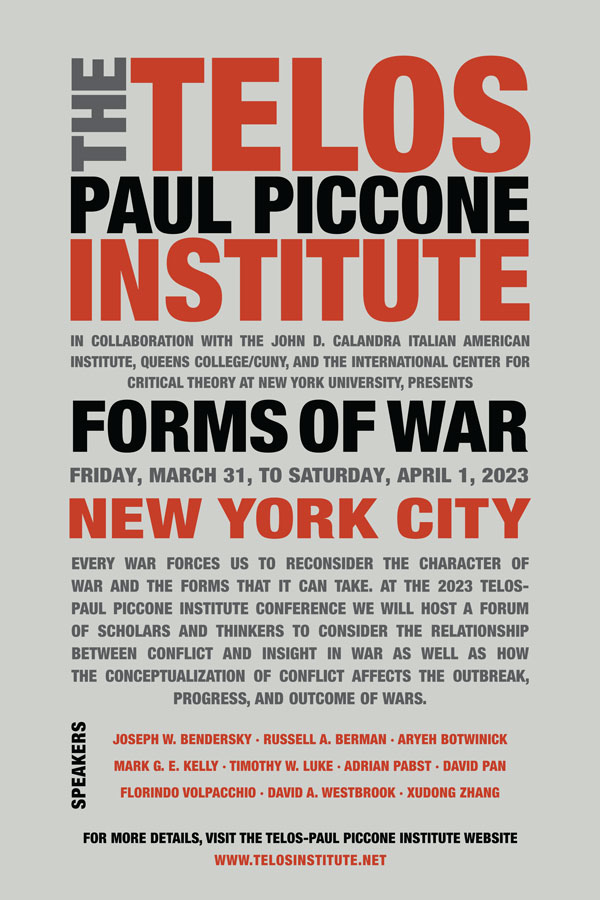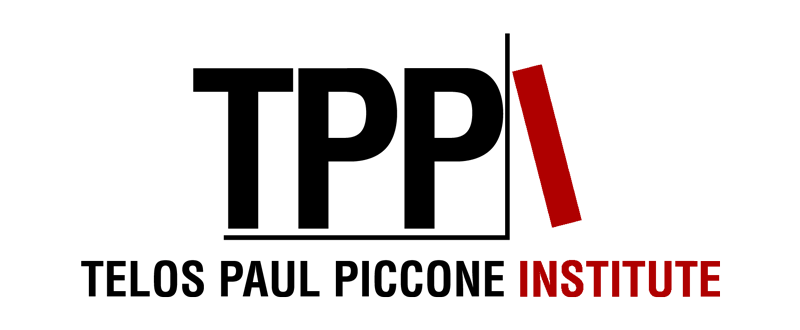The 2023 Telos-Paul Piccone Institute Conference
March 31–April 1, 2023
The John D. Calandra Italian American Institute, Queens College/CUNY
New York, NY
Forms of War
Co-sponsored by the John D. Calandra Italian American Institute, Queens College/CUNY and the International Center for Critical Theory, New York University.
Conference program (PDF)
Conference videos
Conference Description
 One of the most challenging aspects of the war in Ukraine is the way in which the conflict has been constantly shifting in its form. In the first place, there is a conventional ground war between Russia and Ukraine, in which the identity and will of the two peoples is at stake. Yet Russia has used weapons supplied by Iran, and Ukraine depends on NATO for its own supplies, indicating that this war depends on the maintenance and expansion of alliances. The stability of these alliances in turn depends on a combination of Realpolitik and shared values as the glue that holds them together. This logic of alliances motivates the energy war that Russia is waging with Europe, revealing that, unbeknownst to Europe, Russian energy policy over the last decade was an early form of the war. Similarly, the threat of nuclear war also tests the resolve of NATO, forcing it to consider the values at stake in the conflict. Is the war about Ukraine's sovereignty or the principle of nation-state sovereignty itself? Is it about human rights for Ukrainians or the entire human rights project? For Russia, is it about self-defense or a pan-Slavic identity? Is it about the protection of Russian minorities in Ukraine or the threat of Western secularization?
One of the most challenging aspects of the war in Ukraine is the way in which the conflict has been constantly shifting in its form. In the first place, there is a conventional ground war between Russia and Ukraine, in which the identity and will of the two peoples is at stake. Yet Russia has used weapons supplied by Iran, and Ukraine depends on NATO for its own supplies, indicating that this war depends on the maintenance and expansion of alliances. The stability of these alliances in turn depends on a combination of Realpolitik and shared values as the glue that holds them together. This logic of alliances motivates the energy war that Russia is waging with Europe, revealing that, unbeknownst to Europe, Russian energy policy over the last decade was an early form of the war. Similarly, the threat of nuclear war also tests the resolve of NATO, forcing it to consider the values at stake in the conflict. Is the war about Ukraine's sovereignty or the principle of nation-state sovereignty itself? Is it about human rights for Ukrainians or the entire human rights project? For Russia, is it about self-defense or a pan-Slavic identity? Is it about the protection of Russian minorities in Ukraine or the threat of Western secularization?
The material form of the war—economic, conventional, nuclear—will depend on the way in which the participants on all sides and in all parts of the world come to an understanding about these questions concerning the moral and spiritual stakes in the war. If it is just a matter of giving up Ukraine, then the economic costs for Europe may not be worth the fight, and Russia's victory in the energy war could lead to a general NATO capitulation. But if the freedom and security of central and western Europe are also at stake, then even a severe economic recession would be a small price to pay for the reestablishment of a NATO-dominated security order. Is freedom worth the risk of annihilation? Is peace worth the indignities and repression of authoritarianism? As the most serious global conflict since World War II, the war in Ukraine risks going beyond the bounds of all other forms of war before it. What are the resources that are necessary for meeting its challenges? How can the shifting forms of the war be contained and channeled toward a future lasting peace?
These types of questions are not specific to the war in Ukraine but arise in any situation of war. Every war forces us to reconsider the character of war and the forms that it can take. In the first place, the insight that leads to a war is one about the nature of a conflict. War only begins once the parties determine that there is an otherwise irresolvable conflict about the basis of order. The course of a war also results in a practical insight into the form of a postwar order. Peace and stability cannot arrive until all come to an agreement about the new understanding of order. This intertwining of practical and theoretical gains means that the time of war is also a time of shifting manifestations of the forms by which war is fought, as well as the forms of order to be established by the outcome of the war. The course of a war will be decided by our understanding of the kind of world we want to live in, the risks we are willing to take to establish such a world, and our belief in its practical possibility. A war will necessarily change in form depending upon where we are in the movement from the conflict of competing ideas to the victory of a particular conception of order. Since the result of the conflict would be an establishment of sovereignty based on some understanding of order, the conflict is not just a material one but also a theoretical and spiritual one about the metaphysical basis of order. In the process of war, insight leads to conflict, and conflict leads to insight.
At the 2023 Telos-Paul Piccone Institute conference on forms of war, we will consider different ways of understanding the relationship between conflict and insight in war as well as examples of how the conceptualization of conflict affects the outbreak, progress, and outcome of wars. On the one hand, we will consider the way in which the experience of war, both on the battlefield and on the home front, affects the outcome of the war. On the other hand, we will look at how this importance of the experience of war in turn affects the strategy of war. Such strategizing begins already at the nascent stages of conflict, before any actual fighting begins, but in which the possibility of conflict can already lead to concessions by one side or the other that lead to a transformation of the basis of order. Similarly, fears and hopes for the future also determine the course of a war, helping the participants to end a war by offering them a mutually acceptable vision of the terms of peace.
Questions include:
- What are the different causes of war in any particular case? How do these causes attain such significance that they become a casus belli? Were there alternatives to war that were not taken?
- In what situations does the refusal of war lead to an outcome that is tantamount to surrender in war? How can the threat of war be used as a political tool?
- To what extent is war a continuation of politics? Or is war the breakdown of politics?
- How have different wars been experienced on the battlefield and on the home front? How have the different experiences of war affected the outcomes?
- How does our understanding of world order affect the turn to war?
- What is the relationship between war and peace in terms of international order?
- How do fictional or historical representations of war affect the conduct of war?
- What is the relationship between war and the collective identity of a people?
- How are wars between nation-states linked to their domestic politics? In what situations does an external enemy create unity or division in domestic politics?
- How is war used as a tool in domestic politics, for instance, as a way to divert attention from domestic political problems?
- What are the characteristics of different types of war, such as limited war, absolute war, civil war, cold war, proxy war, phony war, trade war, guerilla war, war on terror, nuclear war? What factors lead to a war being fought in a particular way?
- To what extent can a representation of war replace a real war, for instance, when single combat is supposed to substitute for the combat of armies, or when war is televised?
- What is the relationship between spiritual concerns and the forms of war? Are all wars in some sense religious wars?
Conference Videos
Session 1: War and Theology
Moderated by David Pan
With Aryeh Botwinick, Andrew Wender, and Casey Spinks
Session 2: Great Power Conflict
Moderated by Marcia Pally
With Xudong Zhang, Chia-Yu Liang, and Joseph W. Bendersky
Session 3: War and Liberal Democracy
Moderated by Adrian Pabst
With Mark G. E. Kelly, Alexis Carré, and Rossen Roussev
Session 4: War Today
Moderated by Russell A. Berman
With Carl Mirra, Stephen Trynosky, and Florindo Volpacchio
Session 5: Changing Techniques of War
Moderated by Adrian Pabst
With David A. Westbrook, Mark Maguire (in absentia), and Michael K. Hill
Session 6: Sources of War
Moderated by David Pan
With Jacob Ulmschneider, Matthew J. Dal Santo, and Faisal Ahmad Qureshi
Session 7: Subjective Experience of War
Moderated by Florindo Volpacchio
With Beau Mullen, Mario Bosincu, and Camelia Raghinaru
Session 8: War as Learning Experience
Moderated by Joseph W. Bendersky
With Russell Berman, David Pan, and Adrian Pabst
